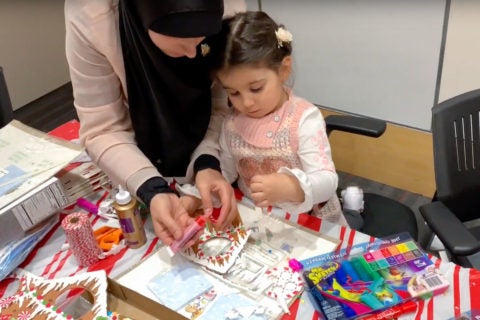
Michael Hsiao spends quality time with his wife, Kimberly, and daughter, Peyton; he encourages other graduate students with children at the USC School of Pharmacy to find similar work-life balance through a new support group. (Photo/Danny Nguyen, Blue Soul Photography)
Support group helps USC students balance grad school and parenthood
Members of the student-led program share advice on making time for work and family life. USC leaders are planning to expand the initiative across the Health Sciences Campus this year.
Michael Hsiao’s 1-year-old daughter had a sixth sense of when he had to study for an upcoming exam.
She always sobbed for attention during cram sessions. It left Hsiao stressed and overwhelmed at times as he pursued his Doctor of Pharmacy degree at the USC School of Pharmacy.
He figured other students in the program also had children, but he felt alone and unsure of where to turn for advice on balancing his busy life as a full-time student and parent. Then Hsiao learned that another pharmacy student also had been asking around about resources for new parents in graduate school at USC’s Health Sciences Campus.
If a support group for student-parents didn’t already exist, he would start one, he decided.
Within months, he rallied a dozen students from the school who were parents. They built a community around their shared identity.
“We all need support,” said Hsiao, 37. “I am fortunate enough to have great support from my wife, but not everyone has support at home. Our group aims to be a resource for those who could use that help.”
Now the informal group he started with other pharmacy student-parents is growing with support from the USC School of Pharmacy’s Office of Diversity, Equity and Inclusion. School leaders are connecting with other departments on the Health Sciences Campus to offer the support program to parents across all graduate programs, including staff and faculty members.
It’s part of a broader effort to reflect on the university’s culture and refocus on its core values, said Melissa Durham, assistant dean of diversity, equity and inclusion and associate professor of clinical pharmacy at the USC School of Pharmacy.
“What does it mean to be the Trojan Family?” she said. “This effort is one way to create that sense of community — where we belong, where we can show up to work or school as our whole selves and where we can create an equitable environment for people who are caregivers.”
USC pharmacy students share advice on balancing parenting and school
Since launching the support group, Hsiao and his peers have created a dedicated Facebook page where student-parents can ask questions and share concerns. They also bring their families together for special events. While the parents mingle and chat, their kids play games or do arts and crafts like building and decorating gingerbread houses during a holiday party.
“A big part of what I wanted to do was to reach out to younger students, so they don’t feel like they are alone,” Hsiao said. “We meet and talk about our experiences and support each other with advice about things we’ve been through.”
The gatherings, both online and in person, help the parents get to know one another and talk through challenges like caring for a sick child while studying.
Having access to a supportive network of other student-parents brought relief to Mona Karim, now a second-year student in the PharmD program. She felt overwhelmed when she started graduate school with a young daughter, Batoul, who was born while Karim was earning her undergraduate degree in biology at USC.
“I wasn’t sure how I could balance everything between my family and school,” she said.
Although she had help — her mother recently moved from Lebanon to join the family, and her husband’s mother also provides support — Karim still worried about managing her responsibilities. To keep up with rigorous coursework in her first year in graduate school, she sacrificed time with her family to study instead. Even on weekends, her husband would take Batoul out for a fun activity while Karim stayed home and prepared for exams or completed class assignments.

Joining the support group helped her connect with other students experiencing similar issues. She appreciated the advice offered by a recent graduate of the program who spoke at one of their events: “She told us that children grow fast, so make sure to enjoy these moments with them, before it’s too late.”
This semester, Karim enrolled her daughter, now 3, in gymnastics and ballet classes and is enjoying watching her progress. She’s also dedicating more one-on-one time with her husband to unwind and reconnect, something she encourages other student-parents to try.
“Make time for yourself and your husband or wife,” she said. “Have some time alone, without the children, to relax and talk about things.”
Support group provides safe space for USC graduate students to share parenting concerns
Hsiao had a similar experience during his first year in the program. His focus on schoolwork started to hurt his relationships with his daughter, Peyton, now 4, and wife, Kimberly.
“Part of learning was going through that year, communicating with my wife and her telling me the things I needed to work on,” he said. “I totally agreed, and since then I’ve devoted more time to them, and it’s definitely improved.”
I’m definitely still learning how to manage my time as a full-time parent and full-time student.
Michael Hsiao
Although it can be difficult to admit to others that his life isn’t perfect, Hsiao said he tries to be open with the struggles he’s faced so his colleagues can avoid similar mistakes. One of his goals in forming the student support group was to create a welcoming and safe space to talk about those challenges.
“I’ve shared that story with everyone who cares to know,” he said. “That’s not something everyone might be comfortable talking about, but it’s important to share, because I’m definitely still learning how to manage my time as a full-time parent and full-time student.”
In addition to sharing personal support with their peers, Karim said the group’s members can advocate for their broader needs, like private areas for breastfeeding and more childcare options at the Health Sciences Campus.
Support group for parents in medical programs at USC to expand this year
Because of the positive reaction to the student-parent group, Hsiao started working with leaders at the USC School of Pharmacy on plans to extend its reach across the Health Sciences Campus. He wants to be sure the network continues to grow, especially after he finishes his degree next year.
His efforts are already paying off. The school’s diversity, equity and inclusion office now provides the group with funding for events, along with marketing and outreach to spread the word. Durham is also building relationships with her counterparts in other health professional programs at USC. They plan to expand parenting support for students and faculty and staff members in the next few months.
“We can all learn from each other,” Durham said. “We’re hoping this is something that can really grow and provide a sense of support and belonging for our people here.”
For more information about the student-parent group at the USC School of Pharmacy, send an email to pharmacy.dei@usc.edu.



